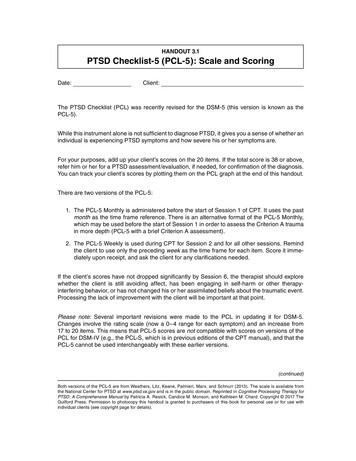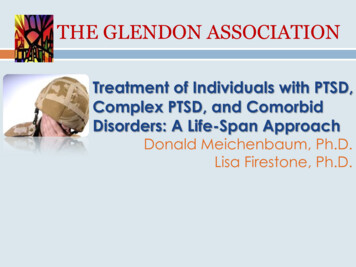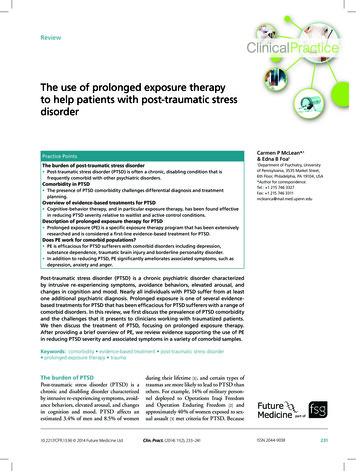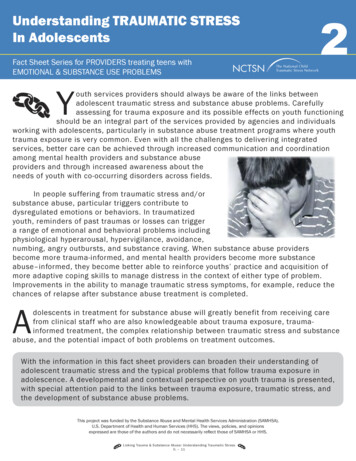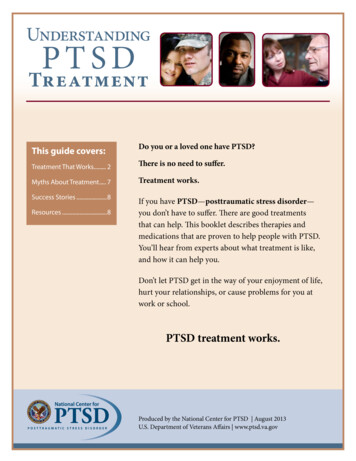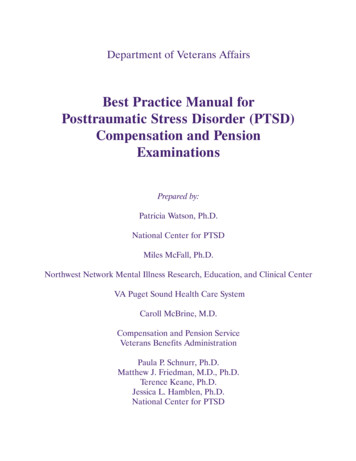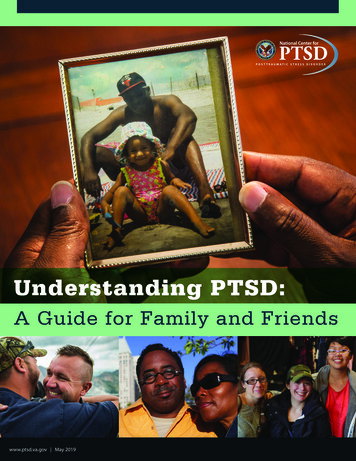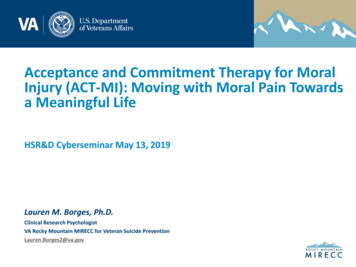
Transcription
An Overview of PTSD andTreatment Perspectives AmongNative American VeteransGreg Urquhart, B.A.Washington State University
History of PTSD and Native AmericanVeterans What is PTSD History of PTSD A brief history of Native American veterans
Literature Review 5 to 17% of returning Veterans suffer from combat related Post TraumaticStress Disorder (PTSD) Research regarding Native American Veterans is lacking Native Veterans greatly underutilize services to treat PTSD Equine Therapy is becoming more popular for treatment of PTSD
Purpose and ParticipantsThis study seeks to gain an understanding of : Attitudes toward PTSDPerceptions about PTSDWillingness to engage in therapyBarriers to seeking treatmentFacilitators of treatment Sample - 588 individuals who identify themselves as Native American Veterans. 478 male 110 female represent all branches of the U.S. military.
Instruments cross-sectional survey design Containing 40 items 39 quantitative 1 qualitative Administered via Survey Monkey.
Procedure Contacted social media sites for : All federally recognized Veteran Service Organizations All state and federally recognized Native American Nations Organizations and nations were asked to help circulate word of the study Participants had the option of requesting a hard copy Results were imported into SPSS Descriptive statistics of data ran. A content analysis was conducted on qualitative data
ResultsGender2%Branch of e24%82%48%CoastGuard
Results: Barriers to treatment
Results: facilitators of Tx.
Results: likeliness to engage in TX./healing
ResultsLikeliness to Engage in AATPerceived Helpfulness of AAT5%Very lpfulNeutral25%Not at %NeutralSomewhatHelpfulVeryHelpful
ResultsAware of others diagnosedwith PTSD7%Did your perception of thisperson gativelyUnsureDid notchange
ResultsDo most veterans who suffer from PTSDreceive adequate treatment?4%19%YesNo77%Unsure
Veterans’ Voices Natives need a different approach to treatment. A trusted brother, a friend,etc. It needs to be based on the old ways included with modern technology.8 There are so many barriers to getting help that it's not worth the frustration ofthe process. I want to see an open forum group where it's completelyanonymous, no paperwork necessary to get help. 12 Native veterans will open and trust other native veterans, military veteransspeak a different language. I would only go to Groups run by veterens.13
Veterans’ Voices There is extreme bias experienced by this person from counselors. Thecounselors lack a knowledge and experience with military and nativepeoples. 77 The distance to travel for treatment is very bad. Most don't have anyoneto go to who understands. 37 A well grounded knowledge of the cultural background of the patient willbe of great assistance and would give focus toward the healing process.175
Discussion Native Veterans are generally unsatisfied with services provided them and viewthem as being inadequate. They desire programs that have staff that are veterans and who can understandtheir experiences in the military as well as their Native background. More facilities and programs designed to treat PTSD should be formed nearmajor populations of Native Veterans. Cost for participation in programs should be significantly reduced or free toparticipants. Programs should be designed to address both primary and secondarysymptoms of PTSD, such as drug or alcohol abuse. Native American Veterans are not likely to have other Native Veterans viewthem negatively due to having PTSD.
Limitations and Future Directions of Study The survey relied on self-report Native American are not a homogenous group, cultural aspects can differslightly from tribe to tribe. More studies needed to replicate and strengthen research A more detailed look at differences between cohorts should be conducted tosee if preferred aspects of treatment differ Qualitative study should also be done to provide depth of information on keyfindings Pilot studies should be conducted
For more information regarding results fromthe survey please contact Greg Urquhart atGreg.Urquhart@wsu.edu
More facilities and programs designed to treat PTSD should be formed near major populations of Native Veterans. Cost for participation in programs should be significantly reduced or free to participants. Programs should be designed to address both primary and secondary symptoms of PTSD, such as drug or alcohol abuse.
